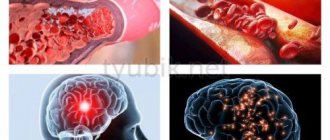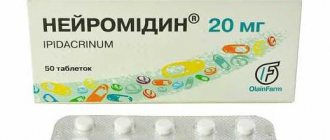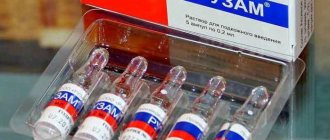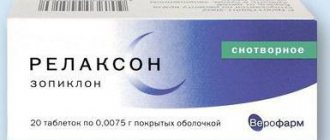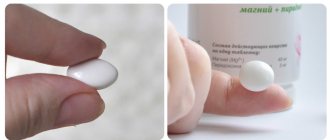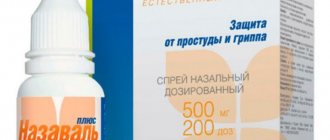Antisten MV is a drug (tablets) (pharmacological group - drugs for the treatment of heart diseases). Important features of the drug from the instructions for use:
How to dissolve vascular plaques, normalize blood circulation, blood pressure and forget the way to the pharmacy
- Sold only with a doctor's prescription
- During pregnancy: contraindicated
- When breastfeeding: contraindicated
- In childhood: contraindicated
- For liver dysfunction: contraindicated
- If renal function is impaired: contraindicated
- In old age: with caution
Release form and composition
Release form Antisten MV is a film-coated tablet of prolonged action. The tablets are biconvex, the film shell is creamy-pink in color, the core is white or almost white with a slight yellowish tint. Primary packaging - contour cell blisters (10, 20 or 30 tablets in one blister) and polymer containers (10, 20, 30, 40, 50, 60 or 100 tablets in one container); secondary packaging – cardboard packs (1, 2, 3, 4, 5, 6 or 10 blisters per pack or 1 container per pack).
Composition of one extended-release tablet:
- active ingredient: trimetazidine – 35 mg;
- excipients: magnesium stearate, microcrystalline cellulose, aerosil, hypromellose;
- shell: opadry II 85F240012 Pink (polyvinyl alcohol, red iron oxide dye, titanium dioxide, yellow iron oxide dye, talc, macrogol 3350).
Use during pregnancy and lactation
In animal studies, the teratogenic effect of trimetazidine has not been established, however, there are no clinical data on its safety when used during pregnancy, so the possibility of malformations in the fetus cannot be completely excluded. Antisten MV is contraindicated in pregnant women.
It has not been reliably confirmed whether trimetazidine is excreted in mother's milk or not. If there is a need to prescribe the drug for indications during lactation, you should discuss with your doctor the issue of stopping breastfeeding.
Pharmacological properties
Pharmacodynamics
Antisten MV is an antihypoxic drug. Its active component optimizes metabolism and function of cardiomyocytes and brain neurons. The cytoprotective activity of trimetazidine is due to an increase in energy potential, acceleration of oxidative decarboxylation and more efficient distribution of oxygen.
Antisten MB supports the ability of the heart muscle to contract, and also prevents a decrease in the level of phosphocreatinine and adenosine triphosphate (ATP) in cells. In conditions of acidosis, the drug normalizes the function of membrane ion channels (prevents calcium and sodium ions from accumulating in cardiomyocytes and stabilizes the concentration of potassium ions).
Trimetazidine reduces intracellular acidosis and reduces the increased phosphate concentration that occurs due to myocardial ischemia and subsequent resumption of blood flow. The drug protects cells from the effects of free radicals, preserves the integrity of cell membranes, increases the duration of the electrical potential, reduces the output of creatine phosphokinase, and reduces the severity of ischemia-induced damage to the heart muscle.
Antisten MV reduces the frequency of angina attacks, as well as the need to take nitrates in these conditions. After approximately 2 weeks of treatment, the patient’s resistance to physical activity increases, and sudden changes in blood pressure disappear. The drug helps reduce dizziness and tinnitus caused by ischemia. In patients with vascular eye pathology, the functional activity of the retina returns to normal.
Pharmacokinetics
Absorption is very fast and almost complete. The bioavailability of trimetazidine is about 90%. After approximately 3–5 hours, the concentration of the drug in plasma reaches its maximum. The patient's condition stabilizes after 60 hours. The volume of distribution of trimetazidine is 4.8 l/kg. The binding to plasma proteins is low – approximately 16%. Excretion is carried out by the kidneys (about 60% of the drug is excreted unchanged). T1/2 is 7 hours, in patients over 65 years of age it extends to 12 hours. Easily penetrates blood-parenchymal barriers. The clearance of trimetazidine from the kidneys is directly dependent on creatinine clearance.
Indications for use of Antisten and Antisten MV
Indications for use of Antisten MV and Antisten are:
- coronary heart disease (coronary disease) - the drug is recommended for use as part of complex therapy to maintain the patient’s condition and prevent angina ;
- pathologies of the choroid and retina with ischemic components;
- dizziness of vascular origin;
- cochleo-vestibular disorders caused by ischemia (for example, tinnitus, damage to the inner ear and auditory nerve, etc.)
Side effects
- digestive system: often – abdominal pain, nausea and vomiting, diarrhea, dyspeptic disorders;
- cardiovascular system: rarely – orthostatic hypotension, flushing of the facial skin;
- nervous system: often – dizziness and headaches; very rarely - muscle rigidity, lack of motor activity and tremor (these effects disappear after discontinuation of the drug);
- skin and subcutaneous fat: often – skin rash, itching, urticaria;
- other reactions: often – asthenia.
Instructions for use, method of application and dosage regimen
Antisten, instructions for use
The daily dose of trimetazidine is 2-3 tablets, which is equivalent to 40-60 mg trimetazidine per day. The multiplicity of techniques, accordingly, is 2-3.
The duration of the therapeutic course is determined by the attending physician and is individual in each case, depending on the effectiveness of therapy and the characteristics of the course of the disease.
Antisten MV, instructions for use
Antisten MV is recommended to be taken twice a day with meals (optimally in the morning and evening). A single dose of the drug is one tablet.
The duration of the therapeutic course is determined by the attending physician and is individual in each case, depending on the effectiveness of therapy and the characteristics of the course of the disease.
special instructions
The drug is contraindicated for the relief of acute angina attacks.
It is also not suitable for the treatment of unstable angina and myocardial infarction in the early stages of the disease.
If an attack of angina occurs while taking Antisten MV, therapy should be reconsidered and adapted for the individual patient.
Do not take a double dose of trimetazidine if one or more tablets are missed.
Impact on the ability to drive vehicles and complex mechanisms
According to the instructions, Antisten MV has almost no effect on a person’s psychomotor abilities, but the possibility of developing such adverse reactions as dizziness and orthostatic collapse during treatment with the drug should be taken into account.
Contraindications
According to the annotation for the drug, the use of Antisten is contraindicated:
- If you have hypersensitivity to trimetazidine or any auxiliary component of the medication;
- Patients with renal failure, if CC is less than 15 ml per minute;
- Patients with severe liver dysfunction;
- Children and adolescents under 18 years of age (due to the lack of sufficient data on the safety of the drug in this age category of patients);
- Pregnant women;
- During lactation.
Reviews about Antisten MV
Patients who took the drug for the purpose of prevention and treatment speak mostly positively about it. Pain in the heart disappears, shortness of breath becomes less, dizziness and tinnitus cease to bother you. However, some reviews of Antisten MB report that the drug is not always effective, especially in advanced conditions. In addition, many complain of adverse reactions (vomiting, palpitations, etc.).
The advantages of the drug, according to patients, also include its relatively low cost (compared to other similar drugs).
Analogs
The following drugs are analogues of Antisten:
- By active ingredient: Angiosil Retard, Vero-Trimetazidine, Deprenorm, Carditrim, Medarum, Metagard, Predizin, Prekard, Preductal, Rimekor, Trimectal, Trimet, Trimetazid, Trimetazidine, Triducard;
- According to belonging to the same pharmacological group and mechanism of action: Biosint, Hawthorn-Alcoy, Hawthorn tincture, Vasomag, Dibikor, Doppelgerz Cardiovital, Ezaphosphine solution, Idrinol, Inosie-F, Cardionat, Coraxan, Coronatera, Kudevita, Kudesan, Mexicor, Meldonium, Midolat , Mildronate, Neoton, Orocamag, Pedea, Riboxin, Serotonin, Taufon, Ubinon, Firazyr, Phosphaden.
Antisten's analogs
Level 4 ATX code matches:
Vazonat
Phosphaden
Hawthorn fruit
Preductal
Meldonium
Angiosil Retard
Ranexa
Lily of the valley tincture
Neocardil
Rimecore
Triductane
ATF-Long
Hawthorn tincture
Triductan MV
Trimectal MV
Trimectal
Neoton
Predisin
Trimetazidine
Tivortin Aspartate
Analogues of the drug Antisten:
- Angiosil Retard;
- Vero-Trimetazidine;
- Carditrim;
- Metaguard;
- Preductal;
- Precard;
- Rimecore;
- Trimet;
- Trimetazidine.
The action similar to that of the drug Antisten MV is possessed by:
- Deprenorm MV;
- Preductal MV;
- Trimetazidine-Biocom MV;
- Rimecor MV;
- Trimectal MV;
- Trimetazidine MV.
Antisten price
The average price of Antisten MV is about 420-500 Russian rubles, Antisten tablets cost about 280 rubles.
- Online pharmacies in RussiaRussia
ZdravCity
- Antisten MV tablets p.p.o.
prolonged action 35 mg 60 pcs. Ozon LLC 323 rub. order
Efficiency
Experts have a positive attitude towards Antisten. But it is not recommended to prescribe it yourself without consulting a doctor. Most experts note that the influence and effectiveness of the drug should be judged by the patient’s condition over time. It will be suitable for one person and will help eliminate the problem when another patient needs to be prescribed another drug with a similar effect.
Reviews from cardiologists
Here are some doctors' opinions:
Dushinsky O.R.: “I prescribe Antisten for shortness of breath and pain in the heart. I consider it an effective medicine for coronary artery disease, which perfectly complements general therapy. Affordable for most patients. One of the advantages is that treatment with this drug reduces the need to take medications based on nitroglycerin.”
Bespoyasko V.V.: “Antisten is a medicine with antianginal, cytoprotective, and antihypoxic properties. Eliminates the clinical manifestations of ischemia, reduces the flow of venous blood to the myocardium, reduces the need for cardiomyocytes for oxygen and reduces the severity of pain. I prescribe it in combination to maintain the patient’s condition and to prevent new attacks of angina.”
general information
Antisten is an antianginal drug that normalizes cellular energy metabolism under conditions of ischemia or hypoxia. The international nonproprietary name of the drug is Trimetazidine. Belongs to the pharmacological group of drugs prescribed for cardiovascular pathologies and used to correct metabolism. This is a long-acting prescription drug available in tablet form.
Release form and cost
The tablets are biconvex, creamy pink, containing 20 and 35 mg of the active substance. The drug is sold in cardboard boxes and packs of 60 tablets. Depending on the dosage, the cost of the drug differs. Average prices are presented in the table (Table 1).
Table 1 - Cost of Antisten
| Name | Price, rubles |
| Antisten tablets 20 mg No. 60 | 529 |
| Antisten MV 35 mg prolong. tab. p.o. No. 60 | 557 |
| Antisten MV tablets 35 mg 60pcs, Ozone | 559 |
Compound
One tablet of Antisten contains 20 or 35 mg of trimetazidine dihydrochloride. Excipients include:
- hypromellose;
- microcrystalline cellulose;
- polysorb;
- magnesium stearate.
Effect of trimetazidine
The film shell consists of:
- polyvinyl alcohol;
- macrogol;
- iron oxide (Iron Oxides);
- talc;
- titanium dioxide.
Indications and contraindications
Antisten is prescribed for a pathological condition characterized by partial or absolute disruption of myocardial blood circulation due to damage to the coronary arteries. The drug is used both for the prevention of angina pectoris and in complex treatment.
For lesions of the inner ear and auditory nerve against the background of cardiovascular pathology, therapy allows you to get rid of severe symptoms:
- dizziness;
- hearing impairment;
- ear noise.
Also, this medicinal product is effective for hearing loss and other vestibular disorders. In addition, it is used for degenerative changes in the choroid of the visual organs in ophthalmology.
Antisten is not prescribed for:
- hypersensitivity to the components of the drug;
- severe liver dysfunction;
- under 18 years of age (since the safety and effectiveness of the drug has not been established for this age category of patients);
- renal failure.
Acute renal failure
No disruption of embryonic development under the influence of this medication was detected in animal studies. But due to the lack of clinical data on the harmlessness of using Antisten when carrying a child, it is not recommended to take it. The risk of pathologies of intrauterine development cannot be excluded.
It is not known whether the active substance passes into breast milk, so this medication should not be used during breastfeeding. If treatment requires the inclusion of Antisten in the treatment protocol, then breastfeeding is stopped.
Pharmacodynamics and pharmacokinetics
Antianginal medication Antisten is used in cardiology for:
expansion and increase in plasticity and elasticity of coronary vessels;- reducing excessive load on the myocardium;
- reduction of venous blood flow arriving to the heart muscle;
- reducing vascular response to constrictor factors;
- relieving pain in the chest;
- reducing pressure in the pulmonary artery and atria.
- stabilization of metabolic reactions in the myocardium
Antisten belongs to the pharmacological group of antihypoxants. Its active components direct cellular metabolism in the energetically correct direction. Instead of oxidizing fatty acids, the drug promotes the oxidation of glucose.
Inhibition of fatty acid blocking occurs by blocking 3-ketoacyl-CoA thiolase. As a result, the concentration of ATB and creatine phosphoric acid in structures during hypoxia is normalized and the heart rate is maintained at normal levels.
Antihypoxants
When the acid-base balance of the body shifts towards increasing acidity, Antisten helps regulate the electrolyte balance of the muscle cells of the heart and neurosensory tissues, preventing the accumulation of calcium and sodium, and normalizing the potassium content.
As a result, a change in the membrane potential in a negative direction contributes to the lengthening of the excitation wave moving along the cell membrane in the form of a short-term change in the membrane potential in a small area of the excitable cardiomyocyte.
The drug minimizes the negative consequences of restoring blood flow through the coronary arteries after ischemia, which often lead to a deterioration in the patient’s condition, reducing the severity of acidosis.
Thanks to its membrane-stabilizing effect, Antisten promotes the restoration of cell membranes, protecting them from the further negative effects of toxins formed during lipid oxidation. By preventing the migration of neutrophils into intervascular tissues susceptible to ischemia, the active substances of the drug prevent further damage.
For ENT pathologies caused by dysfunction of the inner ear, ear noises and dizziness are eliminated. With stable angina, prolonged use of Antisten reduces the number of attacks, reduces the need for nitrates and increases physical capabilities due to an increase in coronary reserves. Antisten MF tablets help:
normalization of the processes of operation of ion channels of cell membranes;- improving potassium levels contained in cells;
- removal of calcium and sodium from the cells that form the heart muscle;
- a decrease in phosphate levels that increase during ischemia;
- reduction of angina attacks;
- normalization of hearing and vision;
- reducing blood pressure surges.
The active components are quickly and almost completely (90%) broken down by the intestinal mucosa. The maximum concentration in the blood is reached within 2 hours. 16% bound to plasma proteins. They are excreted naturally (almost 60% unchanged).
